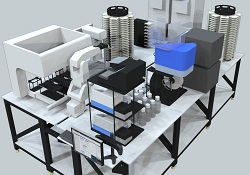A PRODUCTIVITY increase of 100 times, or 10,000 percent, is enough to make any laboratory manager sit up and pay attention. This is exactly what is being claimed for the installation of a customised Yeast 1 Hybrid automation system at Donald Danforth Plant Science Center in St Louis, USA.

Lab robot leads to 10,000% productivity increase at Danforth Plant Centre, USA
The robotic system integrates 16 different instruments to perform 200,000 DNA protein interaction experiments per week. Thermo reckons a traditional manual approach would yield just 2000 experiments each week, and probably drive the technician barmy through the repetitive and gruelling nature of the job.
Most plant genomes contain between 30,000 and 60,000 genes, the transcription of which can be up- or down-regulated by transcription factors binding to the promoter region of the genes. Rather than manually assessing each transcription factor and its effect on each gene, the Yeast 1 Hybrid system automates the process.
By studying the ways plants grow and respond to environmental stresses such as extremes of temperature, flood, or drought, the lab hopes to gain valuable insights into ways to improve crops and meet the changing demands of the population.
“These robots will open new avenues of research in plant science,” said Dr Todd Mockler, associate member and distinguished investigator at the Donald Danforth Plant Center.
“We will systematically investigate all DNA binding proteins in the plants we study and assess their interactions with the regulatory DNA next to the genes. When we have identified all of these interactions, we can start making informed decisions about which genes to tweak to elicit certain effects – enabling them to grow better in drought conditions, for example.”
